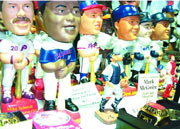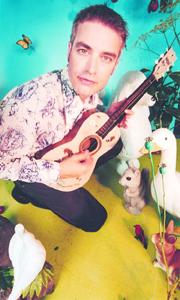I’LL ASSUME THAT nothing went horribly wrong at Tuesday’s All-Star Game (it was played after press time) and say this: Seattle successfully hosted a major event without a hitch. Unless you count the shirtless, drunk-looking guy who ran onto the field and stole a bag of baseballs during the Home Run Derby. But even that can be counted as a triumph: He was subdued and arrested by police, the precious balls were recovered, and nobody got shot or pepper-sprayed.
But what about the hoopla, the 60 elite players whose total combined salary could nearly buy a fancy stadium like Safeco Field, and the various dramatic asides? These things, at least up until the actual game, were certainly less thrilling than Seattle’s glitch-free performance.
The opening press conference, a day before the event at the Seattle Sheraton, set the tone for the two days of home-run slugging and dazzling pitching. Managers Joe Torre and Bobby Valentine ambled onto the dais, announced their starting lineups, and answered the questions everyone knew were coming: What would Bobby say to near-jilted, once-embittered outfielder Cliff Floyd? (“Whaddaya think I’m gonna say?” the prickly Mets skipper replied. “What would make a good story?”) Would Roger Clemens, also on the dais, be uncomfortable pitching to his nemesis, Mike Piazza, for the first time since last year’s World Series meeting? Not really, Clemens shrugged. Almost as an afterthought, a reporter asked Bobby Thomson and Ralph Branca, the architects of baseball’s most notable moment, now 50 years past, to relive the “shot heard round the world.” “Do we have to?” Thomson quipped. “That’s why we’re here,” Branca shot back.
Indeed. That interchange is what the All-Star Game is now about: the need for players past and present to come forth and muse about their glory days (cue Springsteen). At least, that’s what it’s about from a player’s perspective. During the pre-Home Run Derby workout, as a throng of reporters, TV cameras, invited guests, and league officials packed the outer boundaries of the field, most of the All-Stars hid in the batting cage or snuck away to the clubhouse. Nice guys like the Mariners’ John Olerud and Mike Cameron hung around and chatted with anyone who had questions. A-Rod tolerated the latest round of thinly veiled “Don’t you feel stupid about leaving the best team in baseball” questions, wearing his $252 million smile.
When the players’ personalities and the media hype get stripped away, however, Seattle’s second turn as All-Star host will be fondly remembered (at least by those who could afford to participate directly). The sunny weather, the pride in a Mariners team with the best record in baseball—witness the brain-rattling ovation Bret Boone received at the Home Run Derby—and the pageantry of the national pastime all swirled together into a sparkling mass. In answer to Bobby Valentine’s pointed question, that’s your good story.
Richard A. Martin






